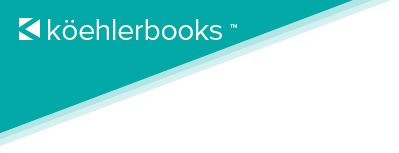April 25, 2024
The Independent Book Publishers Association (IBPA) included Koehler Books in a recent article by Deb Vanasse, titled New and Diverse Publishing Models.
Several models are covered in the article, with KB listed under the heading of TWO TRACKS, due to our offering both traditional and hybrid models to our authors and agents.
____________________
By: Deb Vanasse
Two Tracks
While publishers tend to think of hybrid and traditional as either/or choices in publishing, that’s not always the case. Koehler Books publisher John Koehler has found success by offering both options in his two-track model.
Koehler started out publishing his own books. Friends approached him asking for help with publishing their memoirs, and that led him into the hybrid space. At the time, he says he knew little about how traditional publishing worked.
“In my mind, where money is our friend, to do a feebased model for publishing just made good sense,” he says. But then he started hearing from “literati” that he shouldn’t be charging authors to bring their books to market, so he ventured into traditional arrangements while continuing to offer hybrid deals.
Today, one out of every 10 books Koehler publishes is through a traditional deal, with funding solely by the company. As submissions come in, some agented and some not, his acquisitions editors rate them on a 1-5 scale based on quality and sales potential. His interviews with authors of the highest scoring projects help him decide whether to offer a hybrid arrangement or a traditional publishing deal with a modest advance on royalties.
Theoretically, traditional deals have the potential to drive more sales, but Koehler points out that this isn’t always the case. Rather, he points to the less tangible reasons to maintain a traditional track within his publishing model. “It legitimizes the company to be working with agents and high-level authors,” he says. “It honors the history of publishing. It honors the best of the best, those authors and agents who have achieved liftoff and are the elite.”
Koehler’s two-track system includes what he terms a hybrid incentive program in which hybrid authors who reach a certain sales threshold—2,000 copies in the standard arrangement—are guaranteed a traditional publishing offer on their next acceptable work. “This makes it possible for our hybrid authors to reach the big leagues,” Koehler says. “They run hard after this goal, even though I tell them that selling 2,000 books is not easy for a debut.”
Koehler used a full-service distributor for a time, but he found that with returns, his bottom line suffered. Now the company does only print-on-demand through Ingram Spark, where he says they are one of the bigger volume publishers. “The entire planet is going to just-in-time manufacturing,” he says.
Regardless of where and how authors publish, Koehler offers two digital pocket guides at no cost, one focused on publishing and the other on book marketing. The publishing guide alone has had over 200,000 downloads, he says, and Ingram offers it as a resource on its website. “We truly want to educate new authors,” he says. “Many are called, but few are chosen. But they can learn, and we help by giving them free copies of our pocket guides.”
Koehler encourages fellow publishers to explore innovative models. “I would not advise any new publisher to only do traditional deals,” he says.




